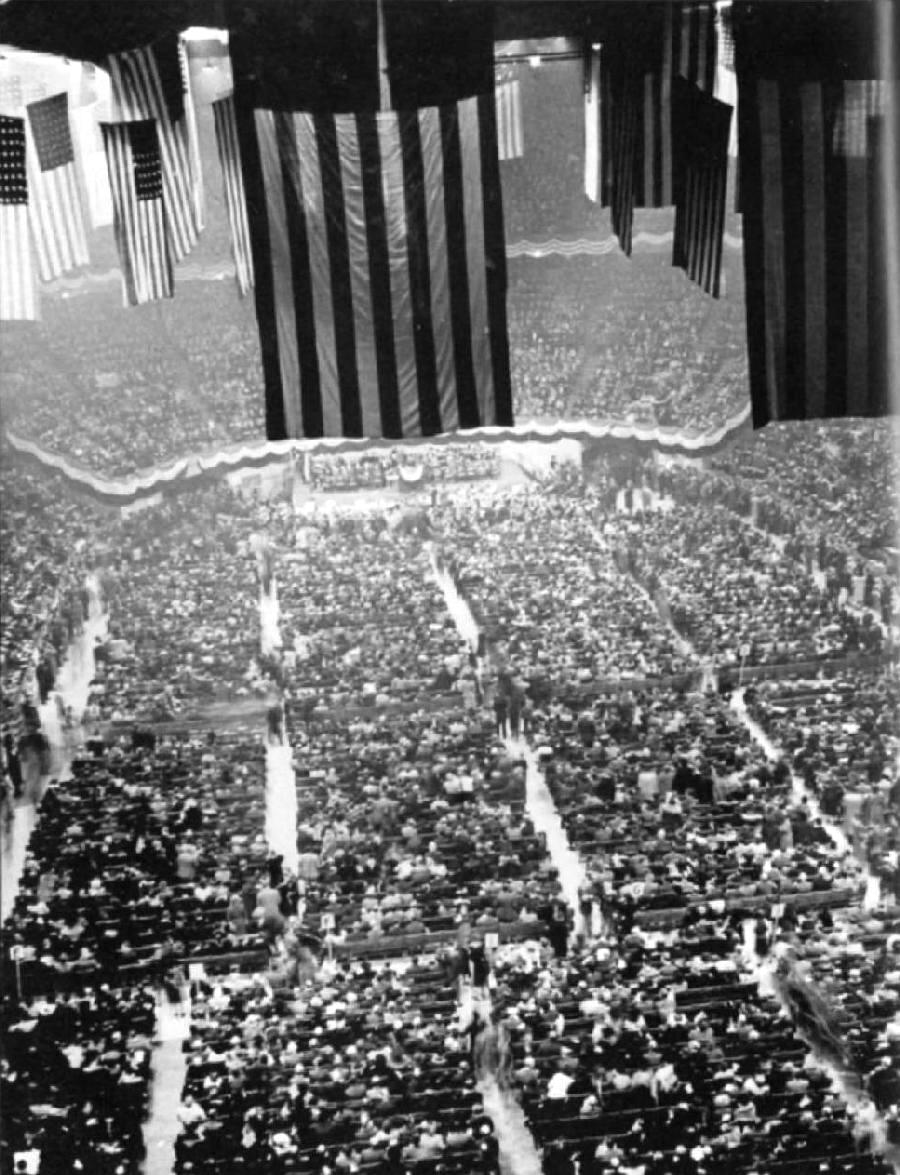
American World War II Isolationist Groups: America First Committee

Figure 1.--Famed aviator Chatles Lindbergh here is addressing an American First rally at Maddison Square Garden in New York City (October 30, 1941). Isolationist groups like the American Firsters lost battle after battle with President Roosevelt, but undoubtedly helped to limit the President's options as he struggled to aid Britain and confront NAZI Germany. Here the American Firsters are conducting their last effort, an attempt to prevent the renewal of the Selective Service (draft) Act only weeks bedore Pearl Harbor. Had Linbergh and the other Anmerican Firsters succeded, the United States essentially would have been without an Army when the Japanese struck.
|
|
Americans concerned about the Roosevelt Administration's weakening of the Neutrality Acts to support the Allies formed The America First Committee (AFC) in September 1940. Some of the organizer were Robert E. Wood, John T. Flynn and Charles A. Lindbergh. They organized 450 local chapters and claimed more than 0.8 million members. Important Americans including Congressmen soon spoke up to support the AFC. Some even had participated in the fight against American participation in the Laeague of Nations. Important supporters included Burton K. Wheeler, Hugh Johnson, Robert LaFollette Jr., Hamilton Fish, and Gerald Nye. The AFC was the single most important voice for isolationism in America. The AFC promoted the idea that the United States should build an impregnable defense so that no foreign country would dare attack America. They insisted that American democracy could only be preserved by avoiding involvement in a European War. They thought that aid to other countries weakened America's own defense. [HBC note: We know now that while the AFC was arguing against involvement that the Japanese were actually planning an attack and the NAZIs were designing weapons systems which could reach America. The impact of the AFC's campaign would have left an isolated America without alliesto fight the NAZIs and Japanese strengthened by the resource and industies of conquered nations.] The AFC's publicity campaign was orchestrated by John T. Flynn. One advertisement read: "The
Last War Brought: Communism to Russia, Fascism to Italy, Nazism to Germany. What Will Another War Bring To America?" Father Charles Coughlin, one of the most important radio commentators of the 1930s, in April 1941 begamn to endorse the AFC in his broadcasts and publication Social Justice. Couglin was another AFC proponent whose message included anti-Semitism. Senators including Gerald Nye, Burton K. Wheeler, Hugh Johnson, Robert LaFollette Jr., Henrik Shipstead, Homer T. Bone, James B. Clark, William Langer, and Arthur Capper attacked Lend Lease. Americas engaged in a intense debate as to whether aid shoulkd be given to Britain and risk war with Grmany. There was also a conern that military equipment shipped to Britain might fall in German hands.
The debate engulfed the entire nation. [Goodwin, p. 194.] Presiden't Rooevelt with a masterful Fire Side Chat, helped sell Lend Lease to the American people. In many ways it was NAZI barbarity that moved American public opinion. Americans saw the Luftaffe pond London in the movie newsreels and listened to Edward R. Murrow's broadcasts and gradually came to agree with the President that the NAZIs could not be dealt with in any way but force and that America itself was threatned. In the end, the Senate passed Lend Lease by 60 votes to 31. This was thge key vote as Britain ws approaching the point that it no longer had the financial resources to purchase war materials in America. The AFC actively opposed the Administration's efforts to aid Britain throughout 1940 and 41.
Sources
Goodwin, Dorris Kearns. No Ordinary Time. Franklin and Eleanor Roosevelt: The Home Front in World War II (Simon & Schuster: New York, 1994), 759p.
CIH -- WW II

Navigate the CIH World War II Section:
[Return to the Main isolationist group page]
[Return to the Main isolationist sentiment page]
[Return to the Main World War II American isolation and FDR page]
[Return to the Main World War II page]
[Biographies]
[Campaigns]
[Children]
[Countries]
[Deciding factors]
[Diplomacy]
[Geo-political crisis]
[Economics]
[Home front]
[Intelligence]
[POWs]
[Resistance]
[Race]
[Refugees]
[Technology]
[Bibliographies]
[Contributions]
[FAQs]
[Images]
[Links]
[Registration]
[Tools]
[Return to Main World War II page]
[Return to Main war essay page]
Created: 7:06 PM 6/19/2013
Last updated: 12:41 AM 3/5/2018



